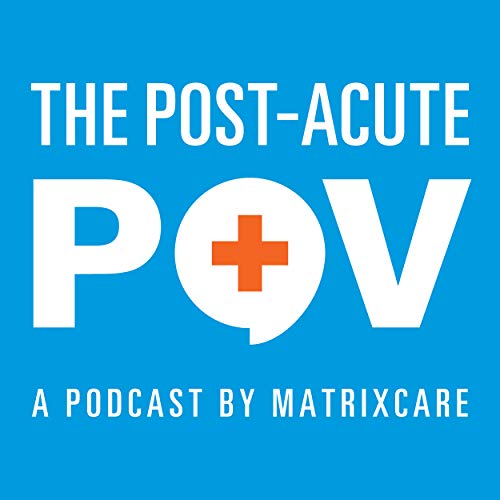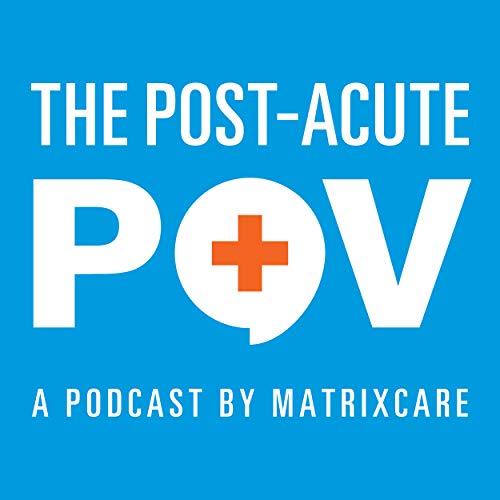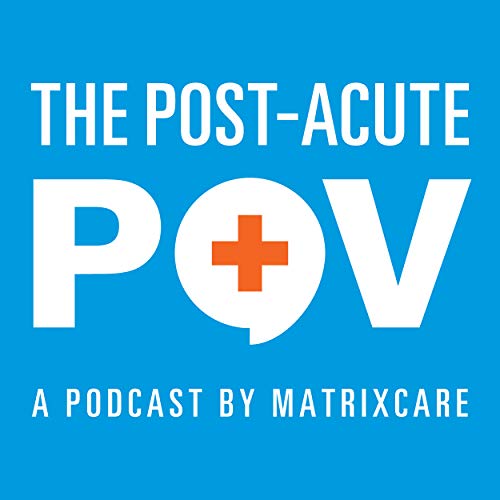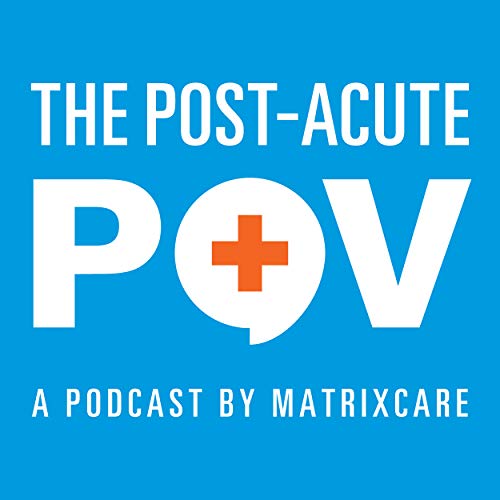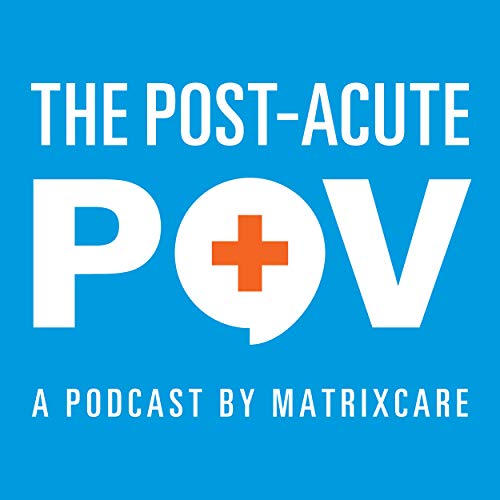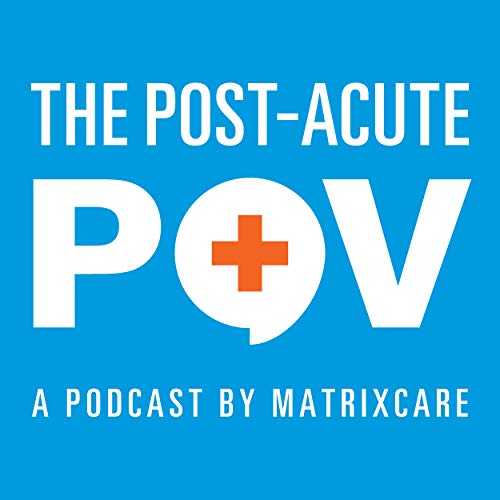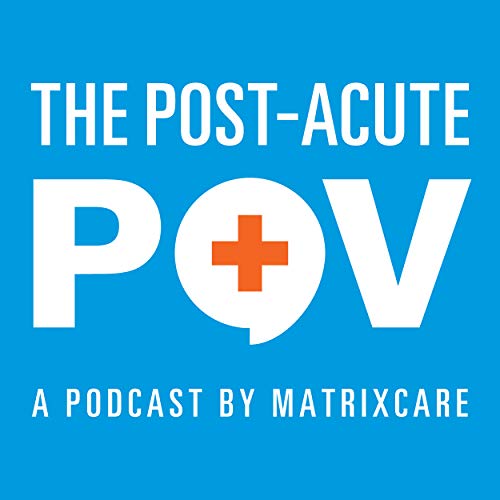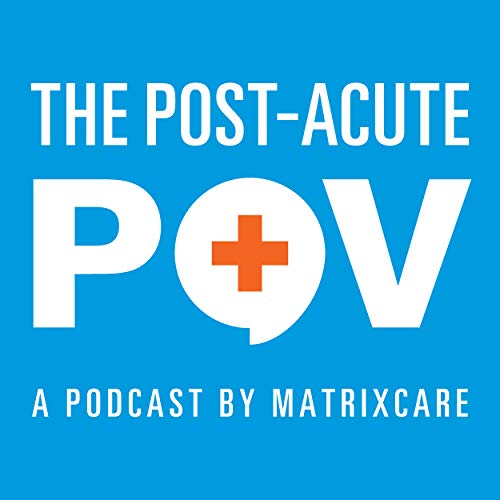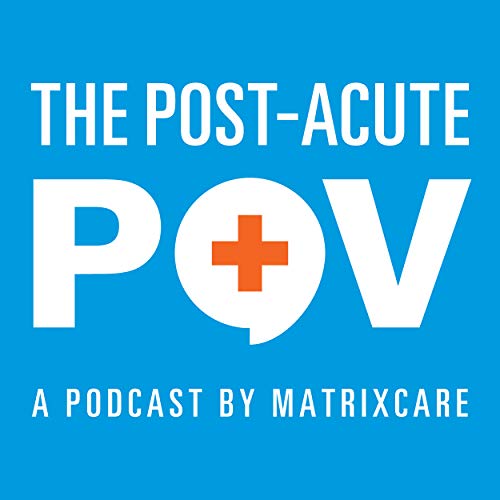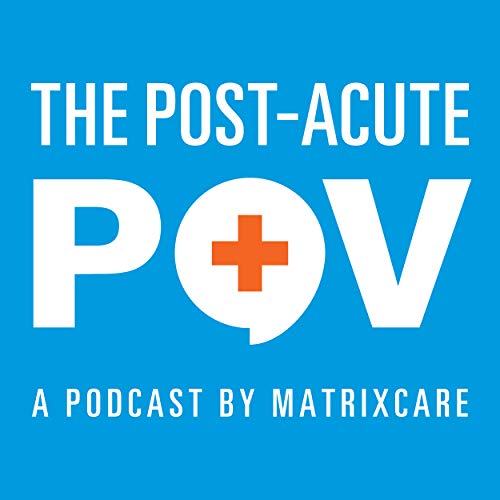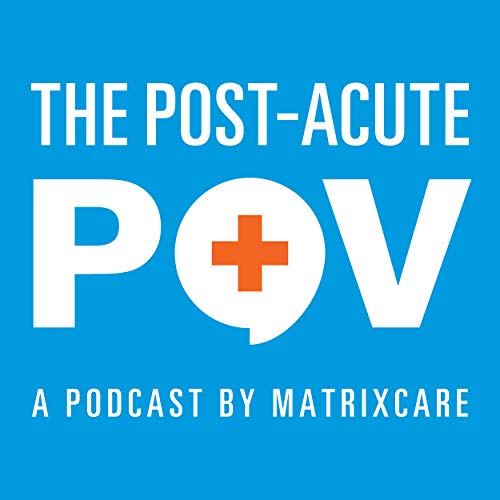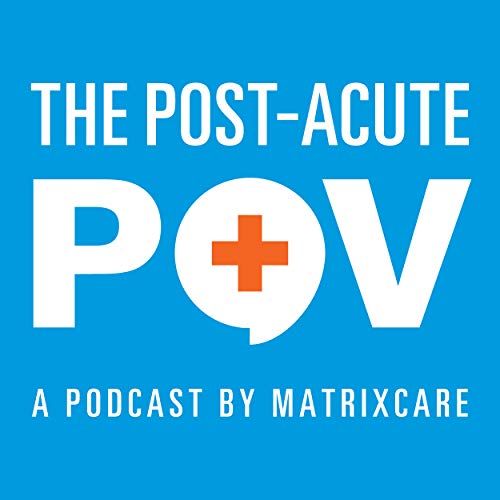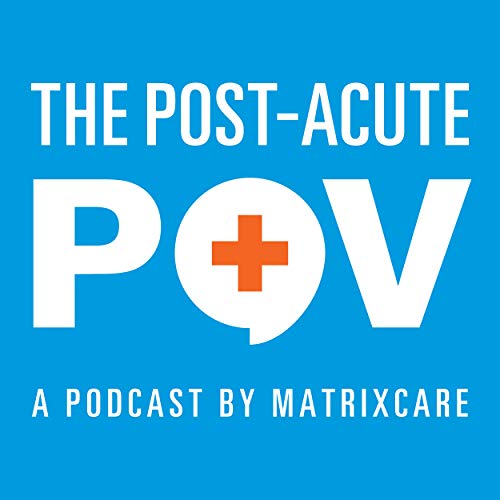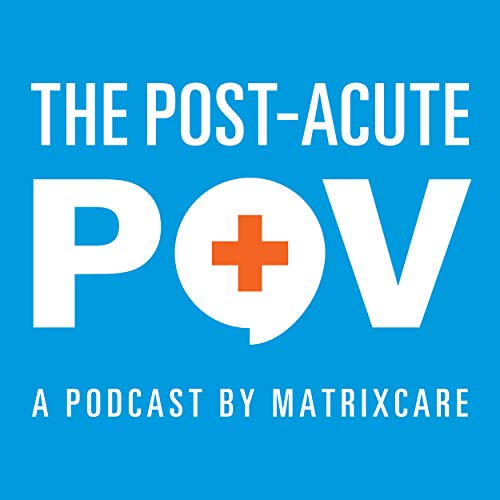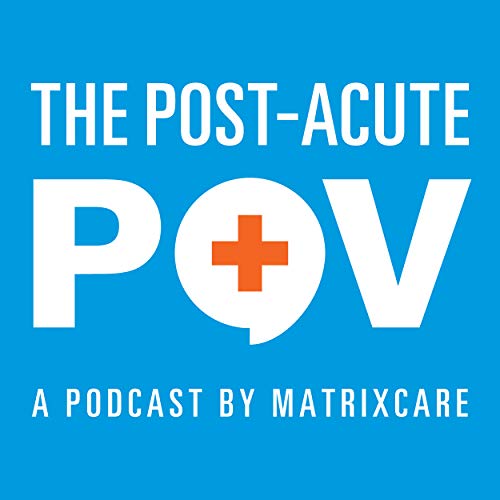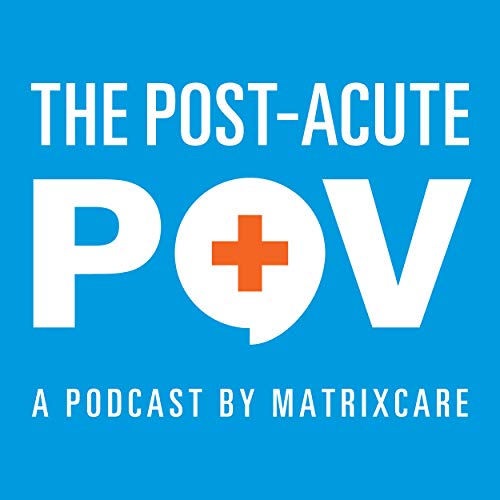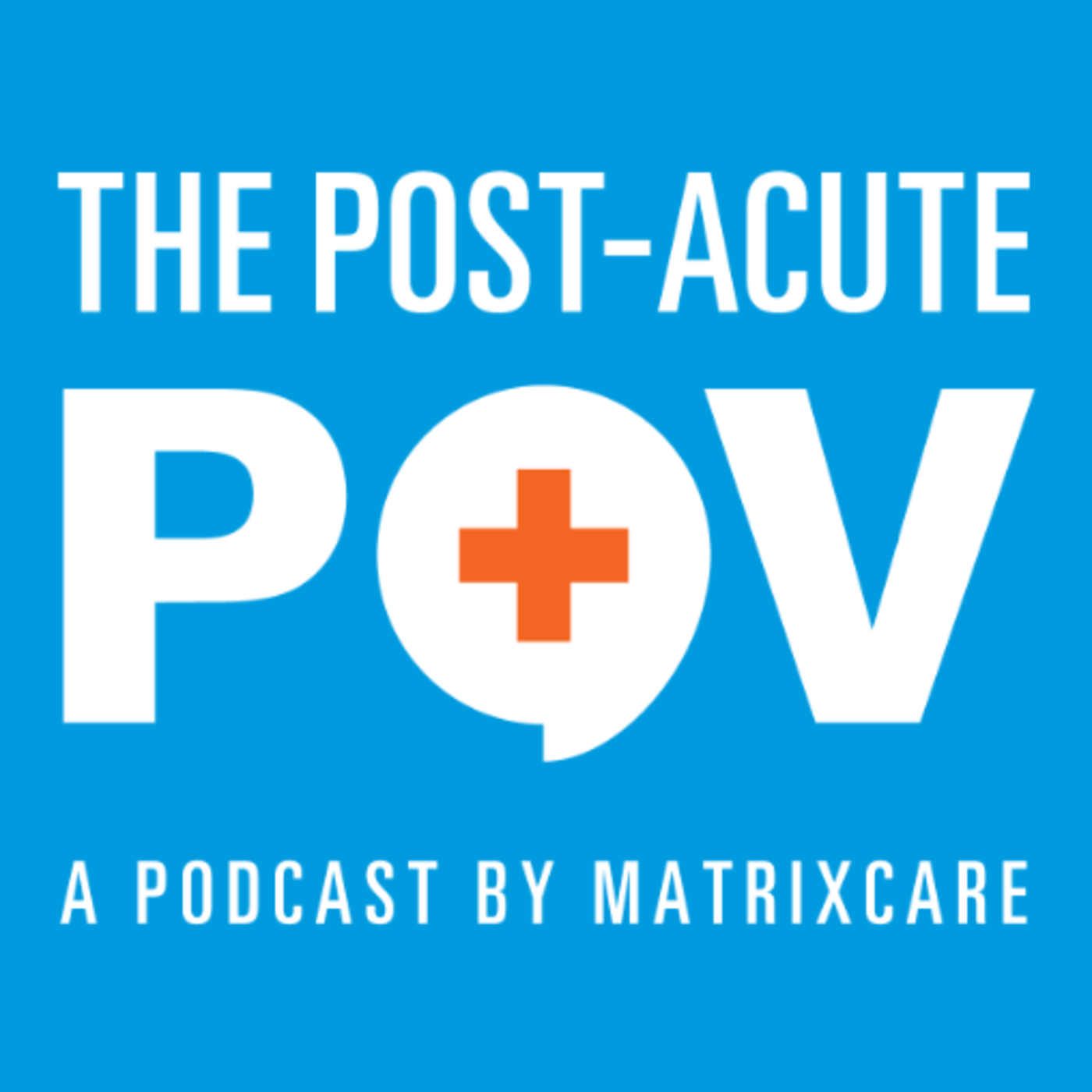Discover The Post-Acute POV
The Post-Acute POV

The Post-Acute POV
Author: MatrixCare
Subscribed: 9Played: 28Subscribe
Share
© All rights reserved
Description
Tune in for informative conversations covering a range of topics for post-acute providers. The Post-Acute POV focuses on the importance of innovative technology in care settings, and how it can help home-based and facility-based organizations optimize clinical, operational, and financial processes while delivering exceptional care and support for patients and residents. With new topics and guests on each episode, we explore trends and solutions that make connecting and collaborating across the care continuum more important than ever for skilled nursing, life plan communities/CCRC, senior living, private duty, home health, and hospice providers.
98 Episodes
Reverse
In the latest episode of the Post-Acute POV podcast, our host Shane Curtis, Head of Revenue and Customer Success for Home Health and Hospice, is joined by Scott Hampel, President of Medalogix, to explore the integration between MatrixCare and Medalogix for the Pulse platform—a clinical decision support tool for home health and hospice agencies.
Their discussion dives into the challenges of delivering personalized care, the transformative role of AI and machine learning in overcoming those hurdles, and the value the Pulse platform brings. Tune in to discover how AI can support clinicians by analyzing clinical data, generating risk scores, and recommending care interventions.
Topics discussed during today’s episode:
[00:35 – 03:49]: Scott Hampel shares his career journey and how he transitioned into healthcare, ultimately joining Medalogix to drive innovation in post-acute care. He explains how the company leverages AI and data analytics to enhance patient outcomes and experiences.
[03:49 – 08:04]: Scott addresses the challenges clinicians face in delivering personalized care amid regulatory and quality pressures. He highlights how AI and machine learning help by analyzing patient data to deliver actionable insights that boost care quality and efficiency.
[08:04 – 12:21]: Scott outlines how aligning the Pulse platform with clinicians’ workflows has led to strong adoption, improved patient outcomes, and greater efficiency for care teams.
[12:21 – 17:14]: Scott describes AI as a clinical assistant that supports better care through data-driven insights while preserving the critical human element. He also shares his outlook on integrating generative AI and data science into post-acute care.
[17:14 – 21:48]: Scott underscores the value of using AI and data science to prioritize patient visits and embed clinical companions into workflows. He encourages providers to explore Medalogix’ free analysis to see how its solutions can drive measurable improvements.
Resources
Learn more about MatrixCare at: https://www.matrixcare.com/
Find out more about Medalogix: https://medalogix.com/
Find more information on the MatrixCare and Medalogix integration: https://www.matrixcare.com/blog/deliver-smarter-data-driven-home-health-care-with-our-new-integration/
Listen to more episodes of the Post-Acute POV
Disclaimer
The content in this presentation or materials is for informational purposes only and is provided “as-is.” Information and views expressed herein, may change without notice. We encourage you to seek as appropriate, regulatory and legal advice on any of the matters covered in this presentation or materials.
©2025 by MatrixCare
In the latest episode of the Post-Acute POV podcast, host Jim Berklan, Executive Editor of McKnight’s Long-Term Care News, introduces a dynamic panel discussion led by Chris Pugliese, Head of Interoperability at ResMed. Joining the conversation are Chris Lukezic, RN, Director of Clinical Informatics at Saber Healthcare Group, along with Tanna Wright, Intake Supervisor, and Danya Fahlstrom, Revenue Cycle Manager, both from Northwest Respiratory Services.
Together, they dive into the real-world challenges faced by skilled nursing and HME providers during transitions of care. From communication breakdowns to their direct impact on patient outcomes, the panel explores what it takes to bridge the gaps and build stronger collaboration across the continuum.
Tune in for practical insights and first-hand experiences from the front lines of post-acute care.
Topics discussed during today’s episode:
[00:30 – 02:37]: Host Jim Berklan sets the stage by introducing four experts from the intersecting worlds of HME and skilled nursing. He previews a candid conversation about the complex relationships and common challenges these providers face when collaborating across care settings.
[02:37 – 10:15]: Chris Pugliese kicks things off with a deep dive into interoperability challenges in post-acute care. He explores how better coordination and data-sharing can unlock opportunities for more connected and effective care.
[10:15 – 13:50]: Chris Pugliese continues the conversation, pointing out the pitfalls of outdated analog processes in healthcare. He advocates for digital transformation as a key to improving both operational efficiency and patient outcomes.
[13:50 – 18:51]: Tanna Wright and Danya Fahlstrom share behind-the-scenes perspectives from their roles in intake and revenue cycle management. They highlight how their day-to-day operations impact the broader continuum of care.
[18:51 – 24:02]: The panel addresses the logistical hurdles DME providers face—especially around deliveries and documentation. They discuss how working across different states, technologies, and facility requirements can complicate even the most routine processes.
[24:02 – 29:00]: Chris Lukezic underscores the critical role of electronic signatures and timely communication in preventing care delays. His insights stress the need for proactive coordination to ensure patients receive essential supplies without disruption.
[29:00 – 33:24]: Chris Pugliese and Danya dig into the nuances of documentation and billing, calling for more standardized practices. They also highlight the importance of staff training and the ongoing challenge of navigating inconsistent requirements across facilities.
[33:24 – 38:22]: In the closing segment, the group reflects on the value of strong, collaborative relationships among clinicians, facilities, and HMEs. They emphasize how technology can help bridge gaps and streamline workflows before wrapping up with closing thoughts and gratitude for the conversation.
Resources
Learn more about MatrixCare at: https://www.matrixcare.com/
Find out more about Northwest Respiratory Services: https://www.nwrespiratory.com/
Find details on Saber Health: https://www.saberhealth.com/
Listen to more episodes of the Post-Acute POV
Disclaimer
The content in this presentation or materials is for informational purposes only and is provided “as-is.” Information and views expressed herein, may change without notice. We encourage you to seek as appropriate, regulatory and legal advice on any of the matters covered in this presentation or materials.
©2025 by MatrixCare
In the latest episode of the Post-Acute POV podcast, our host, Jeremy Crow, Head of RCM and Survey, MatrixCare, is joined by Armine Khudanyan, RN, MSN, CPHQ, CEO and Co-Founder, QAPIplus, and Trish Weber, RN, BSN, HCS-D, HCS-O, Manager, Coding & Review Services, MatrixCare. Join us as we delve into the critical role of quality in healthcare and explore how MatrixCare's integration with QAPI Plus is revolutionizing compliance and efficiency.
In this episode, our guests discuss the transformative shift from reactive to proactive quality improvement, the significant benefits of strategic integrations, and the essential role of effective data utilization. Tune in to learn about the proactive approaches that are setting new standards in healthcare quality.
Topics discussed during today’s episode:
[00:31 – 06:01]: Armine shares her journey from acute care nursing to data management and the development of the QAPIplus software. The software has been instrumental in automating compliance, improving efficiency, and reducing administrative burden for healthcare organizations.
[06:01 – 08:15]: Armine discusses the collaboration between QAPIplus and MatrixCare that began in 2024. This integration aims to reduce administrative burdens, enable better decision-making, and provide actionable insights.
[08:15 – 14:44]: Armine emphasizes the importance of proactive quality improvement and continuous compliance in home health care, highlighting the need for constant auditing and closing gaps in procedures. Trish added that quality in documentation directly impacts reimbursement and performance metrics, stressing the significance of accurate and thorough reporting.
[14:44 – 19:49]: Armine describes the benefits of continuous auditing and external evaluations. Jeremy and Trish discuss how outsourcing compliance functions can provide specialized expertise and unbiased insights, enhancing overall quality and efficiency.
[19:49 – 24:10]: Jeremy and Armine discuss the common compliance challenges faced by both small and large organizations. Smaller organizations often lack experience and regulatory knowledge, benefiting greatly from outsourced services, while larger ones may have internal expertise but struggle with prioritizing compliance tasks.
[19:33 – 22:15]: Armine highlights the benefit of eliminating data silos and integrating fragmented systems to improve performance. Jeremy closes out the conversation by thanking our guests.
Resources
Learn more about MatrixCare at: https://www.matrixcare.com/
Find out more about QAPIplus: https://qapiplus.com/
Find a quick guide on the QAPIplus and MatrixCare integration for home health and hospice.
Listen to more episodes of the Post-Acute POV
Disclaimer
The content in this presentation or materials is for informational purposes only and is provided “as-is.” Information and views expressed herein, may change without notice. We encourage you to seek as appropriate, regulatory and legal advice on any of the matters covered in this presentation or materials.
©2025 by MatrixCare
In the latest episode of the Post-Acute POV podcast, our host, Michele Spadola, Senior Product Manager at MatrixCare, is joined by Christina Lukezic, Director of Clinical Informatics at Saber Health. The pair discuss the challenges and solutions in ensuring seamless care transitions for residents in post-acute care.
Listen in as Christina shares insights on the importance of timely and accurate paperwork, the benefits of using technology to streamline processes, and how these improvements lead to better resident care and reduced administrative burdens. The conversation highlights the positive impact of technology on staff efficiency and resident satisfaction.
Topics discussed during today’s episode:
[00:31 – 02:11]: Michele introduces today’s guest and topic. Christina shares her career journey and her role at Saber Health.
[02:11 – 05:53]: Christina discusses the challenges of obtaining timely paperwork for resident admissions and how technology helps streamline the process. She explains how accurate, complete resident profiles enhance care quality and safety.
[05:53 – 08:06]: Christina details how technology improves consistency and efficiency in managing resident admissions by centralizing information and reducing manual paperwork. This allows teams to prepare in advance, leading to better care outcomes.
[08:06 – 14:36]: Michele and Christina explore how technology reduces administrative burdens, enhances information management, and improves the overall experience for residents and families. By minimizing paperwork, caregivers can focus more on bedside care, alleviating stress for both staff and residents.
[14:36 – 19:33]: Christina underscores the importance of proper training and support when adopting new systems, highlighting the significant time savings and accuracy improvements. Michele stresses the need for better information sharing between care facilities and hospitals to enhance patient outcomes and reduce rehospitalizations.
[19:33 – 22:15]: Christina emphasizes continuous improvement in care processes through technology. She encourages organizations to stay committed to advancements and leverage data to drive meaningful change.
[22:15 – 24:04]: Christina highlights the power of data in justifying process changes and reinforcing resident satisfaction and safety as top priorities. Michele thanks Christina for her insights and closes the discussion with a reminder of the collaborative effort required to enhance care.
Resources
Learn more about MatrixCare at: https://www.matrixcare.com/
Find out more about MatrixCare Data Exchange Manager: https://go.matrixcare.com/interop-by-the-numbers.html
Find details on Saber Health: https://www.saberhealth.com/
Listen to more episodes of the Post-Acute POV
Disclaimer
The content in this presentation or materials is for informational purposes only and is provided “as-is.” Information and views expressed herein, may change without notice. We encourage you to seek as appropriate, regulatory and legal advice on any of the matters covered in this presentation or materials.
©2025 by MatrixCare
In the latest episode of the Post-Acute POV podcast, our host, Andrew Donlan, Senior Editor at Home Health Care News, presents a panel discussion featuring Chris Pugliese, Director of Product Management, MatrixCare, as the moderator, and Paul Wilder, Executive Director, Commonwell Health Alliance, Angela Richards, Director of Health Informatics, Andwell Health Partners, and Nick Knowlton, VP of Business Development, ResMed, as the special guests.
Their conversation delves into the critical role of interoperability in post-acute care, particularly with the implementation of the Trusted Exchange Framework and Common Agreement (TEFCA). The group covers key topics such as challenges in data access, streamlining data for home health and hospice, and the importance of engagement in interoperability. Listen in as the panelists stress the value of seamless data exchange and collaboration across the healthcare system to enhance patient care.
Topics discussed during today’s episode:
[00:31 – 01:08]: Andrew Donlan, introduces our panelists: Chris Pugliese, Paul Wilder, Angela Richards, and Nick Knowlton, and our topic for today’s panel: improving health data exchange and interoperability in post-acute care.
[01:08 – 05:40]: Chris Pugliese kicks off the conversation by highlighting key challenges like inefficient care transitions, outdated processes, and limited tech adoption in post-acute care. He also highlights MatrixCare’s focus on balancing innovation with legacy systems, educating stakeholders, and integrating digital solutions to improve data access and care quality.
[05:40 – 09:18]: Chris discusses the importance of interoperability for post-acute providers in the value-based care landscape, focusing on the role of the Trusted Exchange Framework and Common Agreement (TEFCA) and certified entities, called Qualified Health Information Networks (QHINs).
[09:18 – 12:34]: Paul Wilder discusses the evolution and impact of interoperability in healthcare, highlighting Commonwell Health Alliance's role since its founding in 2013. He emphasizes the importance of TEFCA as a government-supported "network of networks" that establishes a unified framework for data exchange.
[12:34 – 16:22]: Nick Knowlton and Paul Wilder highlight TEFCA’s role in building trust and clarifying use of health data especially as technologies like AI evolve, ensuring health data exchange remains secure and collaborative under a unified national framework.
[16:22 – 22:06]: Angela discusses her organization’s use of tools like CommonWell, HealthInfoNet, and MatrixCare to manage referrals and access meaningful patient data, emphasizing the need for accurate, actionable information for frontline care teams.
[22:06 – 28:24]: Paul explains that while interoperability has improved, post-acute workflows often lag due to outdated processes and limitations in real-time data sharing. Paul recommends prioritizing local data connections, focusing on recent and relevant information, and building workflows that align with available data.
[28:24 – 35:03]: Paul highlights how COVID-19 accelerated the use of digital health records as manual processes like faxing were disrupted. Chris promotes the PACIO Project, which aims to create standardized data formats for post-acute providers.
[35:03 – 42:18]: Chris, Paul, Angela, and Nick wrap up by highlighting key points: Angela emphasizes interoperability's role in improving efficiency and safety in post-acute care; Nick urges providers to engage now with referral sources and tech partners; and Paul stresses the importance of data sharing and regularly assessing data exchange quality.
Resources
Learn more about MatrixCare at: https://www.matrixcare.com/
Find out more about Commonwell Health Alliance: https://w...
In the latest episode of the Post-Acute POV podcast, our host, Jessica Rockne, Associate Director of Product Strategy, is joined by Deborah Wesley, RN, BN, MSN, MHA, CEO at Addison County Home Health & Hospice, Janell Solomon, Director of Compliance at Sangre de Cristo Community Care, and Debbie Goings, Advanced Specialist, Customer Support Consultant at MatrixCare.
Their conversation delves into strategies for maintaining compliance and optimizing care in post-acute care. The group covers key topics such as ensuring data connectivity for field staff, the importance of individualized care plans, and practical tools to ensure documentation is thorough and survey ready. Listen in as the panelists stress the value of training surveyors on using the EMR system, making documentation accessible, and using real-time analytics to support fast, efficient reviews.
Topics discussed during today’s episode:
[00:32 – 05:23]: Jessica Rockne, introduces our guests: Deborah Wesley, Janell Solomon, and Debbie Goings. Deborah emphasizes proactive survey readiness, with lessons from the pandemic about maintaining workflows. Janell discusses the importance of accessible policy and procedure manuals, advising agencies to streamline compliance efforts to focus on meaningful actions.
[05:23 – 11:03]: Deborah explains how her agency integrated the policy manual and other tools into their EHR on iPads, making compliance resources easily accessible for field staff. Janell shares an example of a staff member's documentation error and the importance of following protocol precisely, especially for critical tasks like seizure protocols.
[11:03 – 15:41]: Janell describes Sangre’s approach to mock surveys, focusing on manageable audits led by different staff to ensure thoroughness. Deborah details using surveyor guidance and conducting impromptu visits to simulate real survey conditions.
[15:41 – 20:03]: Deborah highlights tools like speech-to-text and coding services that improve efficiency and documentation accuracy. Janell details the benefits of their EHR system, which enhances efficiency and compliance, with surveyors impressed by ease of use and integration of tools like HIPAA-compliant texting.
[20:03 – 26:02]: Deborah and Janell discuss the critical nature of ensuring data connectivity for field staff, where cellular-enabled devices and Wi-Fi allow seamless data access even in remote areas. Janell highlights the importance of individualized care plans to ensure compliance with care standards, using tools like laminated cards for staff. Debbie Goings adds that surveyors often check documentation against care plans during compliance audits.
[26:02 – 30:51]: Deb discusses using a wound care consultant and later an in-house wound care specialist, ensuring all policies are compliant and contracts are clear for surveyor review. Janell recounts how quick EMR training sessions with surveyors improved efficiency.
[26:16 – 32:59]: Deb notes that during recent surveys, they could show low wait times and maintained staffing, crediting MatrixCare's remote work tools with improving work-life balance for staff.
[33:01 – 39:15]: The group closes out their discussion by detailing challenges with goal specificity in documentation, such as measurable objectives and clear timelines in patient care plans, ensuring that goals are specific to individual patients.
Resources
Learn more about MatrixCare at: https://www.matrixcare.com/
Find out more about Addison Home Health & Hospice: https://www.achhh.org/
Find details on Sangre de Cristo Community Care: https://www.sangre.org/
Listen to more episodes of the Post-Acute POV
Disclaimer ...
In the latest episode of the Post-Acute POV podcast, our host, Jim Berklan, Executive Editor at McKnight’s Long-Term Care News, is joined by Reise Officer, Chief Information Officer at Trilogy Health Services, Mike Easley, Chief Information Officer at American Senior Communities, and Bharat Monteiro, General Manager, Senior Living & Long-Term Care at MatrixCare.
The group’s conversation delves into how successful providers are currently leveraging emerging technologies, as well as what trends may become even more important in the future. Listen in as they also cover the importance of employing tech-driven solutions that can analyze and determine future needs, the changing role of caregivers, and how vital strong leadership will be in potential future disruptions.
Topics discussed during today’s episode:
[00:32 – 03:48]: Jim Berklan, introduces our guests: Reise Officer, Mike Easley, and Bharat Monteiro, each a leader in applying innovative technologies in the long-term care field. Bharat shares that today's focus will go beyond buzzwords like AI, wearables, and virtual care. Instead, the discussion will highlight actionable ways these technologies are being used.
[03:28 – 09:10]: Reise discusses Trilogy Health Services' dual areas of focus: improving foundational infrastructure (like telecommunications upgrades) while exploring emerging technologies (e.g., sensors for incontinence care, bed sensors to optimize nighttime checks).
[09:10 – 11:28]: Mike notes that at American Senior Communities, foundational infrastructure is largely set, enabling them to focus on advanced tech to streamline processes, boost communication, and enhance reimbursement. They are also exploring sensors and smartbed integrations.
[11:28 – 13:15]: Bharat describes how MatrixCare's technology roadmap aligns with the needs discussed by Reise and Mike, emphasizing the importance of infrastructure, ambient sensing, and family involvement in care. He highlights the evolving role of family members in the care process, influenced by demographic shifts, and the need for technology to support diverse caregiver teams.
[13:15 – 20:00]: Mike highlights early-stage testing, stressing that change management and clear communication are essential for integrating new technologies. Reise shares that Trilogy is piloting sensors embedded in incontinence briefs and occupancy sensors, aiming to improve resident comfort and workflow efficiency.
[20:00 – 26:16]: Bharat details MatrixCare’s history in AI and fall-risk assessment tools that have helped prevent thousands of falls. Mike describes ASC’s approach to AI, highlighting efforts to integrate AI for improved care across their continuum.
[26:16 – 33:01]: Bharat discusses how technology will assist caregivers without replacing them, helping to manage workloads and prevent burnout. Reise talks about Trilogy's approach to workforce challenges and technology integration. Mike focuses on ASC’s approach to tech change management, emphasizing communication, consistent change, and how tech should enhance, not replace, caregivers’ roles.
[33:01 – 39:58]: Mike emphasizes the need for seamless data integration, noting ASC's partnerships and in-house tools to ensure access to data from various systems. Bharat describes MatrixCare’s commitment to interoperability and creating an "open health ecosystem" that supports data fluidity and security.
[39:58 – 47:56]: Bharat outlines five key strategies for healthcare organizations: openness, ROI-focused investment, verification of new tech, active involvement, and change management. Reise concludes the episode by emphasizing the fusion of interoperability and AI as Trilogy’s top trend, mentioning a need for industry-wide collaboration and transparency to tackle workforce challenges in senior care.
Resources
Learn more about MatrixCare at:
In the latest episode of the Post-Acute POV podcast, our host, Nick Knowlton, vice president of strategic initiatives at ResMed, is joined by Windy Adams, senior vice president of client experience and strategic initiatives at Forcura, a cloud-based software solution that simplifies document workflow, data exchange, and secure communication from any device – all while interfacing seamlessly with customers’ existing systems.
The pair explores Windy's career transition from finance to healthcare technology and the value Forcura provides to post-acute care providers. The conversation highlights Forcura's commitment to enhancing the operational capabilities of healthcare agencies and their integration with MatrixCare that enables staff to make more informed decisions and helps to ensure the highest quality care for patients. Listen in.
Topics discussed during today’s episode:
[00:35 – 02:29]: Nick introduces our guest, Windy, and she provides some background on her transition from working in FinTech to healthcare technology and an overview of the relationship between MatrixCare and Forcura.
[02:29 – 03:55]: Windy shares an overview of Forcura as an enterprise workflow solution that enhances efficiency and care coordination.
[03:55 – 05:21]: Next, the pair dives into current trends in agency operations, including centralization, staff investment and interest in AI solutions.
[05:21 – 06:29]: Windy details Forcura's response to the demand for technology enhancement, focusing on referral management and care coordination.
[06:29 – 07:33]: Windy provides use cases for Forcura's referral summary, including improving intake efficiency and supporting billing and coding.
[07:33 – 08:23]: Windy shares strategies for encouraging physician adoption of Forcura’s e-signature technology by simplifying the process.
[08:23 – 09:01]: Nick and Windy discuss data security and Forcura's HITRUST certification as a measure of commitment to secure technology.
[09:01 – 09:41]: The pair covers the user experience when integrating Forcura with MatrixCare, focusing on reducing manual data entry and enhancing documentation processes.
[09:41 – 10:59]: Nick closes out the conversation by asking Windy to touch on future innovations in Forcura's software, focusing on AI integration and improved data interoperability.
Resources
Learn more about MatrixCare at: https://www.matrixcare.com/
Find out more about Forcura: https://www.forcura.com/
Listen to more episodes of the Post-Acute POV
Disclaimer
The content in this presentation or materials is for informational purposes only and is provided “as-is.” Information and views expressed herein, may change without notice. We encourage you to seek as appropriate, regulatory and legal advice on any of the matters covered in this presentation or materials.
©2024 by MatrixCare
In the latest episode of the Post-Acute POV podcast, our host, Rob Stoltz, senior business development director, is joined by Matt Challberg, CEO, and Luca Ventura, CTO, who are both co-founders at Tallio, a healthcare technology innovation company building the best tools for people who provide the best care.
The group explores the recently established strategic partnership between MatrixCare and Tallio. This industry-first collaboration aims to transform how home health and hospice organizations complete documentation, improving the clinician experience and unlocking staff capacity while empowering clinicians to focus more on patient care. Listen in.
Topics discussed during today’s episode:
[00:35 – 02:04]: Rob introduces our guests, Matt and Luca from Tallio, and they provide some background on their careers and how they found themselves in their current roles.
[02:04 – 03:35]: Matt shares how Tallio began and the problems in post-acute care they were looking to solve including staffing constraints and how technology can make the jobs and lives of clinicians easier.
[04:03 – 05:32]: Matt details how they gathered data in the early days of Tallio and a recurring issue they found was documentation and the regulatory burden present in post-acute care. This finding led them to their goal of marching toward documentation zero and naming their product, DocZero.
[05:57 – 06:56]: Luca joins the conversation to shine a light on how Tallio is leveraging advancements in generative AI to help reduce manual documentation for clinicians.
[07:23 – 08:30]: Luca goes on to describe how voice-based generative AI has greatly improved the overall user experience of speech-to-text technology.
[08:59 – 12:20]: Matt describes how the feedback they’ve gathered in the field has directly impacted the products they’ve designed, focusing on a simple and easy to use interface.
[12:57 – 15:42]: Matt touches on the partnership between Tallio and MatrixCare and how the integration of voice-based generative AI into clinicians’ native platforms will be the extra mile in providing productivity gains and tremendous time savings for clinicians.
[15:42 – 18:12]: Rob closes out the conversation by touching on emerging trends in voice technology and thanking Luca and Matt for joining this podcast episode.
Resources
Learn more about MatrixCare at: https://www.matrixcare.com/
Find out more about Tallio: https://www.tallio.com/
Listen to more episodes of the Post-Acute POV
Disclaimer
The content in this presentation or materials is for informational purposes only and is provided “as-is.” Information and views expressed herein, may change without notice. We encourage you to seek as appropriate, regulatory and legal advice on any of the matters covered in this presentation or materials.
©2024 by MatrixCare
Introduction
In the latest episode of the Post-Acute POV podcast, our host, Rob Stoltz, senior business development director, is joined by Shelly Baas, clinical informatics coordinator at FaithHospice, Travis Fawver, solutions architect at Inovalon, John Larscheid, solutions engineer advisor at Inovalon, and Rachael Feeback, senior product manager at MatrixCare.
The group explores the pillars of Medicare Targeted Probe and Educate (TPE), the role revenue cycle management tools can play in safeguarding against TPE audits, and proactive measures to protect your organization’s financial health. Listen in.
Topics discussed during today’s episode:
[00:35 – 01:24]: Rob Stoltz introduces our guests for today’s episode from FaithHospice, Inovalon, and MatrixCare.
[01:24 – 05:42]: Rachel kicks off the conversation by building a clear understanding of what Targeted, Probe, and Educate (TPE) is.
[06:24 – 08:02]: Shelly joins the conversation to share her organization’s experience with TPE and preparing for TPE audits.
[08:02 – 12:00]: Shelly touches on potential challenges that can arise during the TPE process and how to best prepare your team to react.
[12:20 – 14:26]: John chimes in to discuss the unique role of revenue cycle management tools in navigating TPE.
[14:26– 20:50]: Next, John touches on the current landscape of revenue cycle management and the potential benefits of adopting technology to streamline workflows.
[21:18 – 26:16]: Travis joins the conversation to detail ways to identify the need for RCM tools and how to measure the efficiency of these tools. Travis also touches on proactive measures to protect your organization's financial health.
[26:16 – 26:49]: Rob wraps up the conversation and thanks our guests for their participation and insights.
Resources
Learn more about MatrixCare at: https://www.matrixcare.com/
Find out more about FaithHospice: https://faithhospicecare.org/
Discover Inovalon: https://www.inovalon.com/
Listen to more episodes of the Post-Acute POV
Disclaimer
The content in this presentation or materials is for informational purposes only and is provided “as-is.” Information and views expressed herein, may change without notice. We encourage you to seek as appropriate, regulatory and legal advice on any of the matters covered in this presentation or materials.
©2024 by MatrixCare
Introduction
In the latest episode of the Post-Acute POV podcast, our host, Chris Pugliese, Director of Product Interoperability, is joined by Holly Miller, MD, MBA, FHIMSS, Chief Medical Officer, MedAllies, Brooke Vanderpool, MSN, RN, Assistant Vice President of Patient Services, National HealthCare Corporation, and Allison Rainey, APRN, FNP-BC, our Head of Nursing and Clinical Informatics.
The group explores the critical role of technology in streamlining care transitions and promoting patient-centered, cost-effective care while providing actionable strategies providers can implement today to enhance care coordination, boost patient outcomes, and gain a competitive edge. Listen in.
Topics discussed during today’s episode:
[00:35 – 03:21]: McKnight’s Senior Living Editor, Lois Bowers, introduces Chris and our guests for this episode.
[03:21 – 06:36]: Chris kicks off the conversation by introducing key topics including the current state of interoperability and technology gaps in post-acute care.
[06:36 – 11:28]: Next, Chris introduces a policy spotlight, examining the CURES Act, TEFCA, and the establishment of a certification process for QHINs.
[11:28 – 13:59]: Chris touches on the unique problems in skilled nursing including the separation from the rest of healthcare, patients receiving care for more extended periods of time, and multiple providers having overlapping responsibility for one patient.
[13:59 – 16:01]: Brooke joins the conversation to discuss her organization’s unique interoperability needs and what tools have helped meet their growing set of demands.
[16:01 – 17:55]: Dr. Miller details her experience with 360x and how the program designed a closed loop referral process for long-term post-acute care.
[18:24 – 21:05]: Next, Allison offers insight on the best way to communicate information from one care setting to another in a timely and cohesive manner.
[21:21 – 23:42]: Miller discusses the key benefits facility-based care providers can achieve using QHINs.
[24:17 – 24:58]: Brooke emphasizes the importance of having a timely, accurate, and up-to-date exchange of information.
[25:44 – 28:15]: Allison shares her thoughts on the main obstacles around adopting EHR certification.
[28:15 – 29:19]: Dr. Miller goes on to explain the importance of electronic interoperability.
[29:39 – 31:52]: Brooke wraps up the conversation by touching on ways to streamline information sharing with hospitals.
Resources
Learn more about MatrixCare at: https://www.matrixcare.com/
Learn more about our skilled nursing solution: https://www.matrixcare.com/resources/#skilled-nursing
Check out MedAllies: https://www.medallies.com/
Discover National HealthCare Corporation: https://nhccare.com/
Listen to more episodes of the Post-Acute POV
Disclaimer
The content in this presentation or materials is for informational purposes only and is provided “as-is.” Information and views expressed herein, may change without notice. We encourage you to seek as appropriate, regulatory and legal advice on any of the matters covered in this presentation or materials.
©2024 by MatrixCare
Introduction
In the latest episode of the Post-Acute POV podcast, our host, Melissa Polly, Senior Director of Marketing, is joined by Daniel Zhu, VP of Product, Data, Analytics, and AI/ML, and Jessica Rockne, Head of Product Management, to have a conversation on the current applications of artificial intelligence in the world of home-based care and identify key challenges and opportunities associated with the adoption of these groundbreaking technologies. While post-acute care is behind in adopting AI, organizations can no longer ignore the benefits it can bring to their business.
During their discussion, the trio aims to answer the following questions:
What is artificial intelligence (AI) and machine learning (ML)?
How will these rapidly evolving tools impact the delivery of care in the home?
How can these adaptive technologies help organizations tackle the ongoing staffing shortage and operational inefficiencies?
Listen in to discover how these adaptive technologies are innovating our industry and the technology trends that will impact home health and hospice for years to come.
Topics discussed during today’s episode:
[00:35 – 02:25]: Melissa introduces Jessica and Daniel as well as the topic of today’s podcast episode: the future of AI in home-based care.
[02:25 – 04:48]: Daniel kicks off the conversation by offering insights on how we should define AI as it applies to home-based care.
[04:48 – 07:54]: Daniel goes on to explain the importance of large language models and their real-world application.
[07:54 – 11:42]: Jessica joins the conversation to discuss the use cases of AI in care at home models today.
[11:42 – 15:52]: Jessica then describes how machine learning can quickly identify what issues a patient may be facing and present this data in a way that's easy to understand.
[15:52 – 16:56]: Jessica goes on to discuss what the future of artificial intelligence in care at home might look like.
[16:56 – 17:53]: Daniel jumps back in to detail how the modern AI systems already in place can help streamline a variety of tasks in your healthcare operation.
[18:16 – 19:06]: Jessica offers insight on how AI can be adopted to enhance the quality of care for patients with chronic illness.
[19:29 – 20:50]: Next, Daniel outlines the proper way to notify patients and obtain their consent to utilize their data in an AI-based program.
[20:58 – 21:27]: Jessica provides insight on how the commute to see patients in their home can be used as preparation like listening to a podcast or audiobook.
[21:42 – 23:11]: Daniel goes on to explain how these technologies can improve patient safety and reduce hospital readmissions.
[26:12 – 26:38]: Jessica wraps up the conversation detailing how clinicians can help patients feel more comfortable with AI technology.
Resources
Learn more about MatrixCare at: https://www.matrixcare.com/
Explore our solutions for home health and hospice care: https://www.matrixcare.com/home-health-software/
Listen to more episodes of the Post-Acute POV
Disclaimer
The content in this presentation or materials is for informational purposes only and is provided “as-is.” Information and views expressed herein, may change without notice. We encourage you to seek as appropriate, regulatory and legal advice on any of the matters covered in this presentation or materials.
©2024 by MatrixCare
Introduction
In the latest episode of the Post-Acute POV podcast, our host, Amy Wootton, RDN, Head of Product, is joined by Allison Rainey, ARPN, FNB-C, Head of Nursing and Clinical Informatics, and Sandy Hudak, RN, Associate Product Manager, to have a conversation on advanced strategies for nutrition care planning that can be tailored to senior needs. Together, they examine how analytics documentation for PDPM plays a key role in reimbursement.
During their discussion, the trio also explores how nutrition affects the overall health of seniors, new approaches for menu creation and how technology can assist with healthy meals. Tune in for valuable insights about innovative planning strategies designed to support a comprehensive approach to senior health that can lead to improved outcomes.
Topics discussed during today’s episode:
[00:35 – 02:28]: Amy introduces Allison and Sandy as well as the topic of today’s podcast episode: tackling nutrition beyond the plate.
[02:28 – 05:45]: Allison kicks off the conversation by offering insights on person-centered care planning and the value it brings to our residents and healthcare centers.
[05:45 – 09:56]: Allison goes on to explain the importance of a comprehensive resident view for accurate nutrition planning.
[09:56 – 13:16]: Allison then describes the advanced functionalities that organizations need to leverage when developing high-quality care plans and providing the highest level of care.
[13:16 – 18:05]: Sandy joins the conversation to discuss using data analytics to help monitor the effectiveness of care plans.
[18:05 – 22:56]: Sandy touches on how data analytics can serve as an opportunity to begin nutritional assessments in your organization.
[22:56 – 26:39]: Sandy goes on to discuss how using a data analytics tool can present actionable insights for any organization.
[26:39 – 28:57]: Amy jumps back in the conversation to talk about the value of nutrition management technology for successful meal planning.
[28:57 – 30:59]: Next, Amy offers insight on the benefits of personalized menu plans using a clear understanding of portion requirements that are customized to meet residents’ preferences and needs.
[30:59 – 31:49]: Amy wraps up the conversation discussing how caregivers can reach their nutrition care plan goals.
Resources
Learn more about MatrixCare at: https://www.matrixcare.com/
Learn more about our nutrition management solution: https://www.matrixcare.com/nutrition-management/
Listen to more episodes of the Post-Acute POV
Disclaimer
The content in this presentation or materials is for informational purposes only and is provided “as-is.” Information and views expressed herein, may change without notice. We encourage you to seek as appropriate, regulatory and legal advice on any of the matters covered in this presentation or materials.
©2024 by MatrixCare
In this recent episode of the Post-Acute POV podcast, our host, Nick Knowlton, VP of strategic initiatives, has a conversation with experts Deb Wesley, CEO of Addison County Home Health and Hospice, and Chris Pugliese, our director of interoperability, regarding the expanding role of interoperability in post-acute care settings. Together, they examine real-world examples of implementing electronic referrals, data exchange, medication reconciliation, and care coordination tools.
During their discussion, they explore the key benefits that interoperability offers home health and hospice organizations, highlighting how these technologies can improve outcomes, increase safety, drive efficiency, strengthen relationships with referral sources, and enhance staff satisfaction. Tune in for valuable insights into critical interoperability solutions and learn how leveraging these innovations enables agencies to provide superior patient-centered care. Make sure to tune in.
Topics discussed during today’s episode:
[00:35 – 03:26]: Nick introduces the topic of interoperability in post-acute care and its importance for referral relationships and highlights a survey on how referral sources view interoperability with post-acute care providers.
[03:43 – 06:49]: Nick shares the survey results that show nearly all referral sources would switch providers if they could electronically interoperate.
[07:30 – 10:44]: Nick explains how post-acute care agencies are becoming more satisfied with their EHR vendors, but there is still room for improved interoperability and begins to outline the six steps for developing an interoperability strategy.
[11:42 – 13:41]: Nick shares step number one, make sure that both you and the partner understand the definition of interoperability.
[14:12 – 16:21]: Nick discusses step two, leverage your partnership with your EHR vendor.
[17:09 – 22:58]: Nick describes the third step: evaluate the financial implications of your interoperability strategy, and expands upon the need for electronic referrals.
[23:40 – 26:15]: Steps four and five are introduced, leverage your interoperability strategy to differentiate your organization and explore the clinical labor impact of interoperability.
[26:50 – 29:07]: Nick talks about the sixth step, leverage your interoperability strategy to improve the quality of patient care.
[29:48 – 32:12]: Deb Wesley and Chris Pugliese join the discussion and Deb shares some knowledge on the types of interoperability she has worked with at her organization.
[32:44 – 35:00]: Deb explains how interoperability supports her clinical team and how it has greatly improved relationships with referral sources.
[35:43 – 38:59]: Chris discusses how fast interoperability is gaining traction with referral sources and what he sees happening specifically between referral sources and post-acute care providers.
[39:18 – 41:18]: Chris explains how interoperability ecosystems enable seamless app integrations.
[41:39 – 43:22]: Deb shares how communication apps are improving real-time collaboration and Nick wraps up the conversation.
Resources
Learn more about MatrixCare at: https://www.matrixcare.com/
Learn more about Addison County Home Health & Hospice: https://www.achhh.org/
Check out our home health solution: https://www.matrixcare.com/home-health-software/
Listen to more episodes of the Post-Acute POV
Disclaimer
The content in this presentation or materials is for informational purposes only and is provided “as-is.” Information and views expressed herein, may...
In this installment of the Post-Acute POV podcast, Rob Stoltz, our host and senior business development director, engages in a conversation with Melissa Bailey, vice president of sales and business development at Swift Medical. In their engaging discussion, the duo delves into the transformative power of Swift Medical's cutting-edge wound care technology and how home-based care patients benefit.
Tune in to this episode as Rob and Melissa explore Swift's mission to enhance wound care through innovative digital solutions, revolutionizing traditional practices and bringing about positive changes in patient outcomes and provider efficiency.
Topics discussed during today’s episode:
[00:36 – 01:55]: Rob introduces the episode and welcomes guest, Melissa Bailey. Melissa explains Swift Medical’s main goal of enhancing wound care through technology.
[02:27 – 05:35]: Rob and Melissa delve into the past challenges of wound care and Melissa explains how wound care used to be measured.
[05:59 – 07:04]: Melissa discusses Swift Medical’s Swift Skin and Wound application that allows for a much more innovative approach to wound care.
[08:05 – 10:25]: Rob and Melissa begin to talk about the integration of AI and machine learning in wound care management.
[10:40 – 13:33]: The duo explores the benefits of Swift Medical’s technology including faster wound healing, reduced hospitalizations, and improved resources.
[14:18 – 16:12]: Melissa shares specific case studies that demonstrate the effectiveness of Swift Medical’s solution and the improved staffing and cost savings that customers have experienced.
[16:55 – 18:43]: Melissa discusses the importance of improved wound care to reduce rehospitalizations.
[19:16 – 22:08]: Rob and Melissa detail the importance of integrating Swift Medical’s solution with MatrixCare, focusing on a clinician-friendly approach and minimizing documentation.
[22:55 – 23:46]: Rob and Melissa conclude the episode.
Resources
Learn more about MatrixCare at: https://www.matrixcare.com/
Check out our home health solution: https://www.matrixcare.com/home-health-software/
Find out more about Swift Medical: https://swiftmedical.com/
Listen to more episodes of the Post-Acute POV
Disclaimer
The content in this presentation or materials is for informational purposes only and is provided “as-is.” Information and views expressed herein, may change without notice. We encourage you to seek as appropriate, regulatory and legal advice on any of the matters covered in this presentation or materials.
©2024 by MatrixCare
In this installment of the Post-Acute POV podcast, Rob Stoltz, our host and senior business development director, is joined by Drew Bringhurst, chief commercial officer at Hospice Dynamix, and Tonya Hall, regional vice president of operations at Sage Family of Companies. Together, they discuss the best ways to utilize data to improve outcomes, optimize revenue and streamline operations in home-based care.
Throughout their discussion, the trio explores how the proactive use of data can improve reimbursement and strategic planning. Tune in for real-life examples of transforming business operations and culture through data insights, addressing the importance of proper documentation and the proactive adoption of analytics in business development. Listen to their conversation.
Topics discussed during today’s episode:
[00:35 – 05:14]: Rob introduces the episode’s topic: How Hospice Dynamix and Sage Family of Companies take advantage of data to streamline their organizations’ practices.
[05:14 – 09:54]: Drew introduces himself and shares how Hospice Dynamix integrates with EHR and EMR systems to support their 3 pillars of utility: financial, regulatory, and business development.
[10:25 – 15:51]: Tonya provides details on her background before discussing the importance of being proactive when it comes to data that can benefit your organization with reimbursement and strategic planning.
[16:17 – 17:42]: Drew details how technology like artificial intelligence, machine learning, and language processing can assist with decision making and compliance in hospice care.
[17:42 – 23:17]: The trio highlights real-life examples of applying learnings from data to shift not only the operations of a business but also the organization’s culture.
[24:38 – 26:39]: Drew details the ways improper or incomplete documentation can hurt home-based care organizations and how technology can help mitigate risk.
[26:39 – 29:36]: Tonya explains how her business development team adopted analytics to improve their strategic plans proactively instead of retroactively.
[30:01 – 33:46]: Rob concludes the conversation with Drew and Tonya by touching on how access to real-time data can improve relationships with referral sources.
Resources
Learn more about MatrixCare at: https://www.matrixcare.com/
Check out our home health solution: https://www.matrixcare.com/home-health-software/
Find out more about Hospice Dynamix: https://hospicedynamix.com/
Learn more about Sage Family of Companies: https://sagefoc.com/
Listen to more episodes of the Post-Acute POV
Disclaimer
The content in this presentation or materials is for informational purposes only and is provided “as-is.” Information and views expressed herein, may change without notice. We encourage you to seek as appropriate, regulatory and legal advice on any of the matters covered in this presentation or materials.
©2024 by MatrixCare
Introduction
In this episode of the Post-Acute POV podcast, Rob Stoltz, our host and senior business development director, is joined by Drew Bringhurst, the chief commercial officer at Hospice Dynamix. Together, they delve into Hospice Dynamix' use of artificial intelligence and data-driven analytics to accurately designate predictive length of stays (PLOS).
Throughout their discussion, the duo explores critical issues related to hospice and palliative care, shedding light on the significance of identifying the right time for hospice care initiation during a patient's stay. Tune in to gain insights into the critical aspects of clearly identifying current and future compliance risks, instilling confidence in your risk assessment decisions. Listen to their conversation.
Topics discussed during today’s episode:
[00:36 – 02:20]: Rob introduces the guest of the episode, Drew Bringhurst, and Drew provides some background on his career and the origin story of Hospice Dynamix.
[02:44 – 05:04]: Drew shares how the Hospice Dynamix platform utilizes artificial intelligence and data-driven analytics to designate a predictive length of stay (PLOS) for each patient.
[05:13 – 07:20]: Drew discusses the evolution of Hospice Dynamix from a financially driven product to then focusing on compliance and finally, putting the patient at the forefront.
[07:20 – 08:53]: The duo addresses the central issue of patients not experiencing the gift of hospice early enough in their length of stay and the importance of identifying the need for hospice care at the correct time.
[09:25 – 12:48]: Drew highlights change as a key obstacle that potential patients encounter when contemplating a shift to Hospice Dynamix. Traditional hospice organizations are unfamiliar with leveraging data, identifying a need for education.
[13:15 – 14:23]: Drew details the ways patients are utilizing the analytics from Hospice Dynamix and making more informed decisions as a result.
[14:23 – 15:57]: Rob concludes the conversation by touching on the future of the partnership between MatrixCare and Hospice Dynamix and thanks Drew for lending his expertise in this episode.
Resources
Learn more about MatrixCare at: https://www.matrixcare.com/
Check out our home health solution: https://www.matrixcare.com/home-health-software/
Find out more about Hospice Dynamix: https://hospicedynamix.com/
Listen to more episodes of the Post-Acute POV
Disclaimer
The content in this presentation or materials is for informational purposes only and is provided “as-is.” Information and views expressed herein, may change without notice. We encourage you to seek as appropriate, regulatory and legal advice on any of the matters covered in this presentation or materials.
©2024 by MatrixCare
Introduction
In this episode of the Post-Acute POV Podcast our host, Melissa Polly, our senior director of marketing, is joined by Rob Stoltz, senior director for business development and strategic initiatives, and Elliot Wood, CEO and President of Medalogix to discuss their personal tips and tricks for leveraging data to obtain improved outcomes in home-based care.
Rob and Elliot discuss strategies for leveraging data using machine learning to improve patient care. The duo will also share insights and ideas on how to put predictive analytics to work and integrate technology into workflows to drive better care coordination. Don’t miss their conversation.
Topics discussed during today’s episode:
[00:34 – 01:38]: Melissa introduces Rob and Elliot and shares some background on their careers.
[02:11 – 06:05]: Elliot begins the discussion by diving into what machine learning is and how it is applied within the home-based care industry.
[06:47 – 09:36]: Elliot outlines the importance of accurate predictions in machine learning, and how to use these resources wisely.
[10:21 – 15:07]: Elliot talks about best practices and how these impact your organization. He also shares examples of how to work with customers using these best practices.
[15:46 – 18:51]: Elliot concludes his portion of the episode by discussing the significance of the implementation process and how the adoption of machine learning technology can be helpful.
[19:14 – 21:22]: Rob explains how interoperability and patient support play a huge role when talking about technology and partnerships.
[22:03 – 25:14]: Rob goes into more detail about the use of interoperability in leveraging data and the environment for remote patient support.
[25:44 – 29:43]: Rob talks about the meaning of an omnichannel approach and how virtual care options allow for a more proactive process.
[30:17 – 35:24]: Rob addresses how using machine learning can not only show potential risks but also stop emergencies from occurring before they begin.
[36:08 – 37:13]: Rob recaps the conversation and concludes the episode.
Resources
Learn more about MatrixCare at: https://www.matrixcare.com/
Find out more about Medalogix: https://medalogix.com/
Discover MatrixCare for home health: https://www.matrixcare.com/home-health-software/
Listen to more episodes of the Post-Acute POV
Disclaimer
The content in this presentation or materials is for informational purposes only and is provided “as-is.” Information and views expressed herein, may change without notice. We encourage you to seek as appropriate, regulatory and legal advice on any of the matters covered in this presentation or materials.
©2024 by MatrixCare
Introduction
In this installment of the Post-Acute POV podcast, Rob Stoltz, our host and senior business development director, engages in a conversation with Joseph Ebberwein, the co-founder and chief financial officer at Corstrata. Together, they delve into Corstrata's innovative evolution, addressing staffing challenges in post-acute care, and the enhancement of wound care outcomes in home health and hospice settings.
During their discussion, the duo explores the pivotal issues related to wound care, shedding light on the financial benefits and value that Corstrata contributes to agencies. Tune in to gain insights into the critical aspects of wound care and discover how Corstrata brings tech-enabled, telehealth solutions for individuals with wounds and ostomies. Listen to their conversation.
Topics discussed during today’s episode:
[00:35 – 01:26]: Rob introduces the guest of the episode, Joseph Ebberwein, and Joseph gives some background on his career.
[01:50 – 03:59]: Joseph shares insights about the evolution of Corstrata and the challenges many staff face in post-acute care settings.
[04:24 – 06:00]: Joseph discusses the different care settings that Costrata engages with and highlights the increasing number of chronic wound patients.
[06:02 – 08:00]: The duo addresses the main problem that Corstrata is solving and the many different resources that they provide access to.
[08:31 – 10:24]: Joseph details the different models used for virtual wound care.
[10:52 – 12:54]: Joseph talks about the importance of access to certified wound nurses and provides more insights on the staffing challenges in post-acute care.
[13:15 – 15:05]: The duo discusses the telehealth technologies used in wound and ostomy care and the process that Corstrata uses when working with agencies.
[15:51 – 18:32]: Joseph highlights the benefits of accurate reimbursement in wound care.
[19:00 – 21:25]: Joseph shares additional services that Corstrata offers and the importance of using advanced wound dressings.
[22:50 – 23:34]: Joseph summarizes Costrata’s key values in an elevator pitch and Rob concludes the episode.
Resources
Learn more about MatrixCare at: https://www.matrixcare.com/
Check out our home health solution: https://www.matrixcare.com/home-health-software/
Find out more about Corstrata: https://www.corstrata.com/
Listen to more episodes of the Post-Acute POV
Disclaimer
The content in this presentation or materials is for informational purposes only and is provided “as-is.” Information and views expressed herein, may change without notice. We encourage you to seek as appropriate, regulatory and legal advice on any of the matters covered in this presentation or materials.
©2024 by MatrixCare
Introduction
In this episode of the Post-Acute POV podcast, Annette Salisbury, senior vice president of HCC clinical services at PruittHealth, is joined by our own, Daniel Zhu, vice president of product management, data, analytics, and AI/ML, and Kelly Danielson, clinical product manager, to outline the future of artificial intelligence (AI) in long-term care and the current impact of proactive care delivery.
The trio shares their personal experiences using artificial intelligence and the benefits and challenges that come along with implementing these new technologies. They also address concerns that have prevented some healthcare providers from implementing AI in their organizations. Listen in to their discussion.
Topics discussed during today’s episode:
[00:35 – 01:19]: The host introduces guests, Daniel Zhu, Kelly Danielson, and Annette Salisbury. Daniel details the key topics of the episode.
[01:59 – 03:51]: Kelly and Annette discuss examples of artificial intelligence technologies and tools being used in long-term care.
[04:34 – 06:03]: Annette addresses how she has helped implement AI in Pruitt’s facilities and how the technology has made a huge impact on patient care and family satisfaction.
[06:11 – 09:02]: Annette outlines how beneficial artificial intelligence can be with the use of data, specifically in electronic health records.
[09:55 – 12:33]: Annette shares how artificial intelligence is proactive and has helped her staff know which patients are at a higher fall risk.
[13:12 – 16:27]: Annette explains the challenges she faced when first using artificial intelligence technology and how her staff reacted to the use of this innovation.
[16:45 – 18:03]: Kelly and Annette discuss the fall program at PruittHealth.
[ 18:29 – 20:46]: Daniel details how artificial intelligence will not replace humans but will drive efficiency and the efficacy of care.
[21:28 – 23:47]: Daniel discusses how AI systems can be valuable for documentation processes and Annette outlines how AI systems are helpful for the nurses.
[24:09 – 26:09]: Daniel summarizes the discussion and concludes the episode.
Resources
Learn more about MatrixCare at: https://www.matrixcare.com/
Discover how we are using AI: https://www.matrixcare.com/clinical-advanced-insights/
Find out more about PruittHealth: https://pruitthealth.com/
Listen to more episodes of the Post-Acute POV
Disclaimer
The content in this presentation or materials is for informational purposes only and is provided “as-is.” Information and views expressed herein, may change without notice. We encourage you to seek as appropriate, regulatory and legal advice on any of the matters covered in this presentation or materials.
©2023 by MatrixCare


